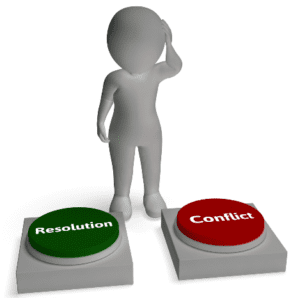Executive Corner – CONFLICT: Making it Healthy
Michael Clegg | 07/20/2022
Conflict is an unavoidable aspect of any relationship. Unfortunately, most people try and avoid conflict, or they wait until they have lost their patience and respond in an emotionally charged way. Conflict resolution is a highly underrated skill. The human brain doesn’t always distinguish between actual and perceived threats. Therefore, it responds to psychological threats, common in interpersonal conflict, almost the same way it responds to physical threats. Once we understand why we feel this way, conflict becomes easier to understand.
The book “Conflict Resolution Playbook” says our emotional mind rages. In contrast, the higher thinking mind essentially shuts off. Unfortunately, we can’t prevent this from happening, but we can learn to manage our reactions.
Conflict is not only necessary, but it is also healthy. It is essential to understand the differences when two people have different opinions or goals. Using this in decision-making is a great way to get a better result. Conflict can help us manage expectations. Unfortunately, conflict often happens due to lacking boundaries or expectations. So many issues arise from unspoken expectations. We make significant assumptions knowing that the other person knows what we want, and we can become resentful when it doesn’t happen. It is also essential to understand that different communication styles can impact conflict.
Benefits of Conflict:
1. Perhaps a significant reason conflict is healthy for relationships is that conflict signals a need for change for both parties.
Conflict provides an opportunity for change if both parties are up for it. Conflict gives you a chance to work on the problems in the relationship.
2. Conflict shows you and the other person that your lives/roles are interdependent.
If they weren’t, then you would not experience conflict, as conflict only comes about when two people whose lives are interdependent hold goals that conflict with one another.
3. Conflict is rarely about what it seems to be on the surface.
Conscious communication asks you to step back, reanalyze the situation as an outsider, and come back to the table to hash out what is going on between you and your partner.

Reasons to have conflict:
- Developing expectations: Lacking formal systems, structure, or expectations: when two people are moving in different directions, and they both think they are correct, conflict arises. However, in an overwhelming majority of situations, no one speaks up. One of the most prominent reasons for keeping quiet is the fear of having a difficult conversation and receiving a negative response. Another reason is being personally wrong rather than making the situation right.
- Promote better feedback. Not only promote it but reward it. When we fail to let people know how they can improve, our frustration grows as their mistakes mount. Similarly, if we give unconstructive feedback—feedback that is vague, very negative, or too personal—we can create destructive workplace conflict. “Carefrontation” should be used when providing feedback.
- Can help develop trust. When you work with the same people daily, and they know that you will always put your best foot forward and provide them with open, honest discussions and feedback, it can help facilitate trust. Resolving conflict moves a relationship forward. Focus on the problem, not the person or personality. Eliminate the “it’s just business” type of comment. While it is business, business is personal.
Resolving conflict is necessary to having Psychological Safety in the workplace. Understanding the other person’s needs and creating expectations within the relationship is critical. In my first job with TEKsystems, the Allegis Group training taught me something called “Carefrontation.” Essentially means that in any conflict, approach it with care rather than confronting someone with malice. That word always stuck with me and has helped me have difficult conversations. Difficult conversations that are open, honest, direct, and straightforward help build trust between two people. Feedback should be given to the benefit of the other person’s improvement. Not to point out what’s wrong. Think about the importance of this for a second. The world’s largest privately held staffing company thought the topic of conflict was significant enough to teach about it in new-hire training. Every company should enlist the idea of carefrontation. It was first coined in the 1970s by Dr. David Augsburger. Below are some tips for “carefrontation.”
- Listen and understand. We all have different backgrounds, upbringing, cultures, and experiences. It’s critical to understand the basis of them.
- Accept anger and own it.
- Invite change, don’t demand it.
- Be open to encouraging mutual trust.
- Forget the blame game. (NO BCD)
- Accept responsibility.
- Be caring and encourage compromise.
One way to “fight” constructively is to switch your perspective from getting your point of view across to trying to understand the other person’s point. Conflicts come in various shapes and sizes, but at heart, they are mainly about not understanding the other person and not understanding what the other person is trying to say—not understanding why they feel the way they do, not understanding their point of view and why this issue matters to them.
The biggest challenge in conflict is when both parties want to “win.” Steve Jobs said that he doesn’t care about being right. He wants to do what is right. The conflict becomes much more manageable if we all develop this ownership mindset. The data even shows that people coming out of a conflict that feels understood gain a feeling of satisfaction. They also rate their day no worse than any day without conflict. Therefore, conflict is about improvement. Getting the situation right, not being the person that is right.
Brian Kight of the “Daily Discipline” spends a lot of time on a couple of areas that I think are important to know when it comes to your mindset, and they both can be used in conflict. The two mindsets are E+R=O (Event + Response = Outcome) and No BCD (Blame, Complain or be Defensive). I use both with my clients frequently. E+R=O mindset is critical to understanding how we handle conflict and our responsibility. We don’t control the events that happen to us in our lives, but we control how we respond. It is ultimately our response to the event that generates the outcome. Regarding No BCD, it would be challenging to try and understand the other person with whom you were in conflict by blaming or complaining. Being defensive is a bad quality for any professional. None of these three actions fall into the personal responsibility category.
Earlier in my career, I thought it necessary to be liked and used that as an excuse not to have difficult conversations. I have learned and taught frequently that each difficult conversation makes it much easier to have the next one. It is a learned behavior. It also teaches you that gaining another person’s perspective helps you get to a better version of any outcome.
